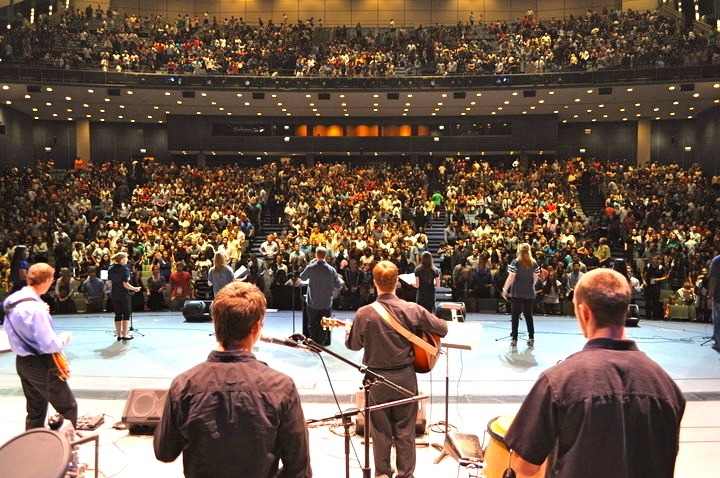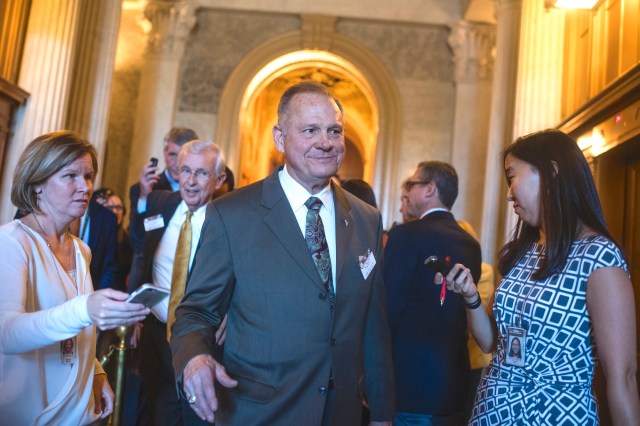Roy Moore is questioned by the media in the Capitol (Credit Image: CQ-Roll Call/SIPA USA/PA Images)

Populism and pedophilia don’t often mix. But they have in the United States, where religious populist Roy Moore, the Republican nominee for a seat in the US Senate, has been accused of dating teenagers and initiating sexual contact with a 14-year-old in the 1970s. The fact that Moore not only remains in the race but may still win is due entirely to unique strain of religious populism that is especially strong in the American South.
One cannot understand American politics without grasping how fundamentally different American Protestantism is from its European cousins. Virtually all European Protestants worship in one of three broad traditions: the Calvinist or Reformed tradition, Lutheran, and Anglican. Each of these traditions has its roots in the early days of the Reformation, drawing their inspiration from events that occurred between in the early to mid-16th century. They differ greatly among one another in doctrine and practice, but they each share some common beliefs.
American Protestantism is quite different. According to the Pew Research Center’s 2014 Religious Landscape Study, fewer than five percent of Americans worship in one of what the study’s author label the “mainline” version of these three traditions. Fifteen percent of Americans belong to either other mainline traditions, primarily Baptist or Methodist, or to a denomination that is almost exclusively African-American in its makeup. Nearly 2% are Mormons, a denomination derived from Protestantism founded in the US in the early 19th century. Most importantly, about one-quarter of all Americans worship in the evangelical Protestant tradition, most of whom are either Baptists, Pentecostal, or non-denominational.
Evangelical American Protestantism is quite distinct from European Protestantism. Doctrinally, evangelical churches emphasize the authority of the Bible alone. They may note the decisions of the early Church councils, but their faith and their worship is centered on Scripture. To that end, they also tend to see Scripture as the literal word of God and believe that the Bible supersedes scientific teaching[1. Per the Pew Survey, 55 percent of evangelical Christians say Scripture is the Word of God and should be taken literally. Only 24 percent of mainline Protestants believe the same]. Thus, many evangelicals do not believe in evolution as Genesis apparently says that God created the earth and all living beings at one moment in time[2. Fifty-seven percent of evangelicals believe that man has always existed in his present form https://www.pewforum.org/religious-landscape-study/interpreting-scripture/].

Evangelical churches are also independent bodies that set their own theologies. While many exist in some communion with other similar churches, such as the Southern Baptist Convention, they do not proclaim a communal authority to establish a teaching for the church as a whole[3. As the official website for the Southern Baptist Convention says, “we recognize that in the New Testament there was no centralized ecclesiastical authority over the churches that forced the churches into any form of compliance. There was encouragement, exhortation, and admonition, but there was never enforcement. We strongly adhere to that principle. Jesus Christ is the head of the local church—we are not. Each church is responsible before God for the policies it sets and decisions it makes.” https://www.sbc.net/faqs.asp]. As such, they are both fiercely independent of one another and strongly distrustful of people or entities that seek to establish a regular rule for all to obey. Baptists, for example, were some of the leading proponents of religious liberty during the American Colonial period in opposition to those who sought to establish the Church of England or other denominations. These differences make evangelical Protestantism out of step with much majority opinion in the United States. America remains a much more religious nation than most in the developed world, with much larger numbers saying they believe in God and attend religious services at least weekly. But evangelicals stand out in their religiosity even by American standards. Fully 88% say they are certain in their belief in God, the most of any religious denomination. Seventy-nine percent say they pray daily, and 58% say they attend religious services at least once a week. These beliefs guide their views of morality too. Sixty percent say they look most to religion for guidance on right and wrong, more than double the share of mainline Protestants who say the same.
These views lead evangelicals, especially Southern Baptists, to unique political views on contentious issues. Sixty-three percent of evangelicals say abortion should be illegal in all or most circumstances, and sixty-four percent oppose same-sex marriage. Only 36% say homosexuality should be accepted, compared with 66% of mainline Protestants and 70% of Catholics. In each case evangelicals are among the most traditional of any American religious group – and distinctly in the minority.
America’s cultural shift to the left has both emboldened and frightened evangelicals. Early moves to cultural modernity led to the creation of what became known as “the religious right”. These early figures, often rooted in the Baptist faith and almost always associated with evangelical Christianity, sought to mobilize “the Moral Majority” to roll back what they saw as attempts to override the will of the people to legalize pornography, abortion, and expand rights for homosexuals. Their efforts picked up steam in the 1980s and by the early 1990s these figures and their followers were important, even crucial, players, in Republican Party politics[4. A European analogy would be the formation of Catholic and Protestant parties in the 19th Century to combat liberals in places like Belgium, the Netherlands, and Germany].
Despite this unprecedented mobilization, evangelicals have largely been routed in the culture wars. Abortion remains legal in all fifty states, state laws against same-sex behavior were struck down by the United States Supreme Court in 2003[5. Lawrence v Kansas, 539 U.S, 2003 (2003)], and same-sex marriage was made the law of the land in the landmark 2015 Supreme Court case of Obergefell v Hodges[6. 576 U.S. ___ (2015)]. At the same time, the Obama Administration sought to require religious institutions to provide birth control, including those that induce abortion, as part of every health insurance policy, making many evangelicals scared that they would be compelled to act in opposition to their faith. This sense of fear was compounded by efforts to require Christian bakers, florists, and photographers to offer their professional services to prospective clients who were engaged in a same-sex marriage ceremony.

The sense that Biblical Christianity could go from essentially a protected status to an oppressed minority within one generation has taken hold of evangelical politics. While religiously devout evangelicals probably voted for Texas Senator Ted Cruz in last year’s Republican primaries, they quickly swung behind the thrice-married New York Presbyterian when he promised to appoint Supreme Court justices that would uphold their views of the Constitution, views that presumably could lead to overturning of the Court decision that made a woman’s right to an abortion a constitutional right. This sense of persecution has even led evangelicals to change their views on the relationship between private morality and public service. According to the Public Religion Research Institute, in 2011 only 30% of white evangelicals thought one could be privately immoral and ethically perform public duties. By 2016, 72% believed that.
Alabama happens to be perhaps the most religious state in America. Forty-nine percent of adults are white evangelical Christians, second only to neighboring Tennessee. And so far, Alabama Republicans are standing by their nominee despite continued proof that Moore sought ought the romantic company of teenagers and minors when he was a single lawyer in Gadsden, Alabama.
Moore’s political history as an ostentatious defender of evangelical Christian beliefs surely has helped him weather this political storm. He rose to national fame as the “Ten Commandments” judge, a justice of the Alabama Supreme Court who sought to establish a monument of the Ten Commandments on state-owned ground only to have his effort ruled unconstitutional by the federal 11th Circuit Court of Appeals. His refusal to obey that court order led him to be removed from the state bench, only to see him return via election in 2012. The fact that in the eyes of his followers he has already demonstrated both his fidelity to their beliefs and been unfairly persecuted for that fidelity helps them believe his claims that the current controversy is simply another conspiracy to prevent him from winning public office.
More telling, though, is the response of Alabama’s Republican Governor, Kay Ivey. When asked about the race, she told reporters that she believed the women who had accused Moore of improper sexual advances. She nevertheless said she would be voting for him in the December 12 special election. “I believe in the Republican Party and what we stand for, and most important, we need to have a Republican in the United States Senate to vote on things like Supreme Court justices, other appointments the Senate has to confirm and make major decisions,” Ivey said. Even a woman who came to office because the former governor had to step down in scandal – he had illegally used state funds to cover up an affair with a much younger staffer – knows her political future would be over if she were to stand up for decency rather than enable an anti-abortion Democrat to win the seat.
The Moore controversy is important to understanding populism in the US. Donald Trump’s core appeal is akin to that of any European populist party that opposes immigration and globalization and gets more support from less-educated men, while the American left is seeing the same sort of critiques of economic neo-liberalism that characterize, in more extreme forms, European leaders like Jeremy Corbyn and parties like SYRIZA and Podemos. But it is nearly unique in the existence of other strains such as the anti-government Tea Party that swept America in the early 2010s and in this evangelical Christian populism. Understanding these unique elements is key to understanding both why cultural issues remain much more politically divisive in the United States than elsewhere and in how President Trump runs his Administration.

But Christian populism is important for leaders in other countries to understand for another, more selfish reason. Evangelicals have been radicalized in part by their continued marginalisation from political life. Their views are almost always defeated and ridiculed by elite opinion, and the fact that their most painful defeats have usually occurred by court edict rather than the democratic process has given rise to the idea that their views will never be permitted to win. British populists agitating for Brexit have similar complaints about the behavior of Brussels and the attempts of die-hard Remainers to keep the UK within the EU or render its departure of merely a legal import through the maintenance of free trade and migration post-exit. Continental populists note the prior history of referenda that are resubmitted to a nation if the version preferred by EU advocates is initially defeated. The idea that one cannot win in a democracy is usually the seeds for the belief that democracy itself is suspect. Keeping that sentiment from growing is perhaps the largest task our political leaders have today.










Join the discussion
Join like minded readers that support our journalism by becoming a paid subscriber
To join the discussion in the comments, become a paid subscriber.
Join like minded readers that support our journalism, read unlimited articles and enjoy other subscriber-only benefits.
Subscribe